Benefits of chickweed—food and medicine
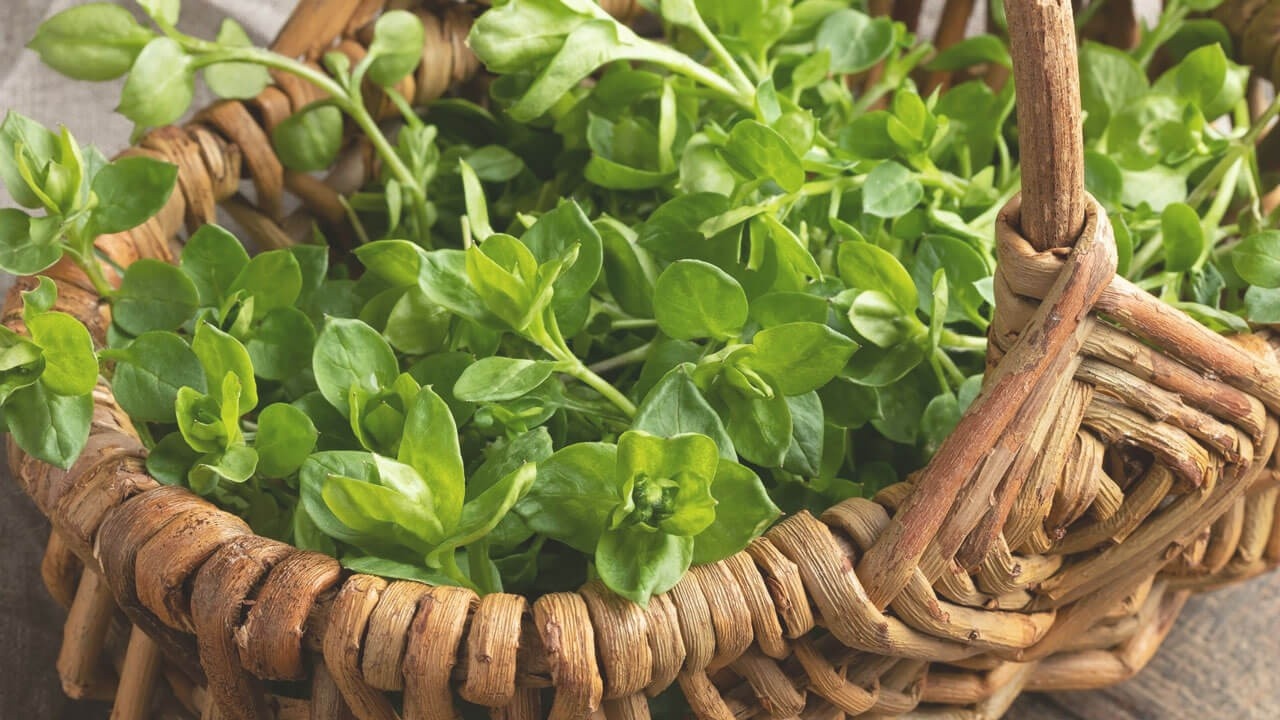
by Corinna Wood
Perhaps you're wondering if you've been weeding a wild plant that you could be eating. It's true, chickweed is much more than just a "weed."
Want to learn about the bountiful benefits of this wild herb?
Before you tear out any more of this lovely little weed, I'll give you the lowdown on how you can bring chickweed's edible and medicinal benefits to your kitchen table and your medicine chest.
Table of contents
- Identifying & harvesting common chickweed
- Fun ways to eat chickweed
- Benefits of chickweed as medicine
- Bring chickweed home with you
Identifying & harvesting common chickweed
Chickweed loves cool, wet weather. This delicious and nutritious "weed" first emerges in the early spring.
The fruit trees are blooming, the birds are back, the sun is rising earlier each day, and it's time to start clearing a space for this year's garden.
And it goes without saying that the weeds will already have gotten the jump on you.
"If you can't beat 'em, join 'em," the saying goes.
But in this case, a more apt formulation might be, "If you can't beat 'em, eat 'em!"
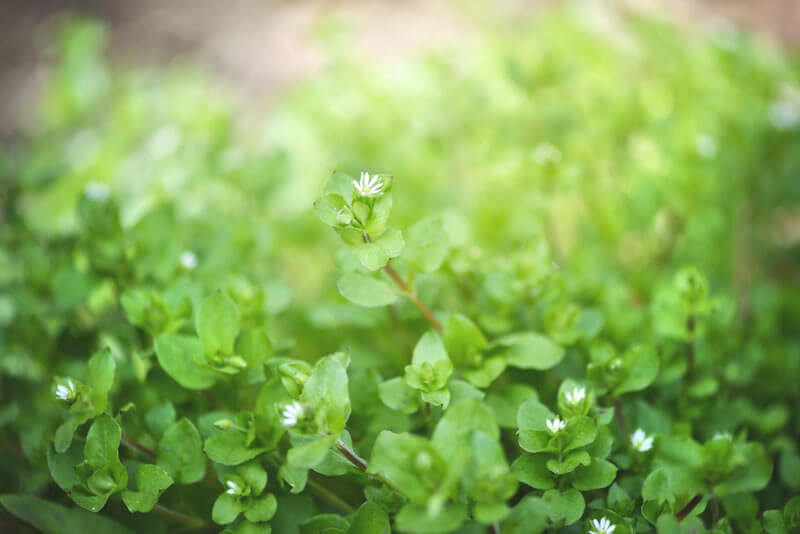
Before you start clearing out those weeds, remember that, unbeknownst to you, your garden may already be producing gourmet salad greens.
You've probably seen peppercress, a wild mustard green that's related to broccoli, with its four tiny white petals on each flower.
Dandelion is opening its sunshine flowers about now.
And then there's plantain, whose parallel veins run up the bright green leaves.
All of these can be eaten or made into medicine.
But if you're lucky, common chickweed (known to botanists as Stellaria media) will have made itself at home in your garden beds by now.
Of course, you want to make sure you have the right plant before you munch on those lush leaves.
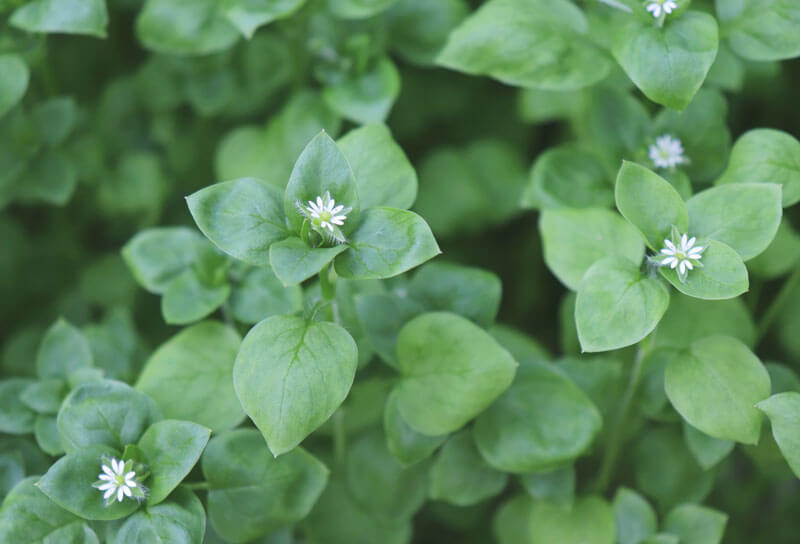
If you’re not certain what you have is common chickweed, look for these characteristics for chickweed identification:
- Egg or oblong-shaped leaves growing on opposite sides
- In spring, chickweed’s “star in the middle” shows white and bright with eight small petals, which develop into beak-shaped seed pods
- A line of fine hairs running along only one side of the stem (The star lady's hairs are tiny, so you may need a magnifying glass for this)
Obviously, it's imperative to positively identify any wild edibles before chowing down. And when in doubt, consult one who knows.
Chickweed often shares space with one of several wild mints, which are harmless but taste icky. Watch what you're doing, so you don't mix in dirty, old or brown chickweed—or any other plants you can't identify.
The easiest way to harvest chickweed is with scissors, as if you were giving it a haircut. Leave the lower portion of the plant so it can continue producing.
By harvesting in this way, you don't need to wash or pick through it—it can go straight into the salad bowl. Chickweed's my gourmet guru!
Fun ways to eat chickweed
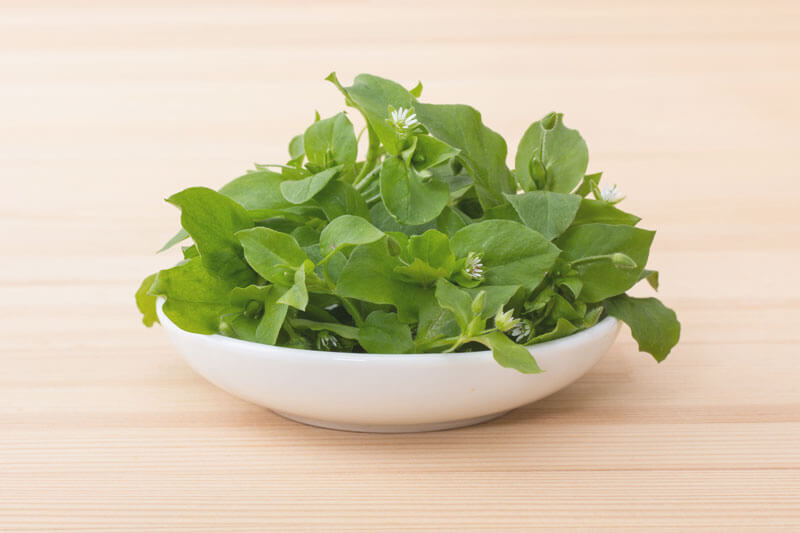 Chickweed is my favorite salad green. It tastes just the way it looks: mild, gentle and bright green!
Chickweed is my favorite salad green. It tastes just the way it looks: mild, gentle and bright green!
As a sister of mine says, "Eating a chickweed salad makes me happy—I find myself laughing out loud."
Wild foods in general give our bodies the exact balance of nutrients that we evolved to eat. And with optimum nourishment, we're less likely to crave empty calories.
When this versatile green is in season, my chickweed rice salad is always a big hit. Just mix equal parts chopped chickweed and cooked rice, then stir in some olive oil, minced garlic and salt to taste.
It's even more delicious with chopped walnuts and crumbled feta cheese.
Another appealing way to introduce your friends and family to chickweed is the BCT (bacon, chickweed and tomato sandwich).
Chickweed also is a tasty addition in an omelette, pasta salad, or potato salad.
And note that chickweed benefits extend beyond the palette.
Common chickweed is loaded with calcium, potassium, iron, phosphorus, manganese, vitamin C, B vitamins and even protein.
Chickweed, used in many herbal weight-loss formulas, also contains saponins (soapy substances that help dissolve unneeded fat cells). And because this wild plant is so nutrient-dense, you're getting a healthy dose of what the human body naturally craves—wild plant nourishment!
As you know, it's essential to positively identify any plants you're harvesting for food or medicine. First things first: Grab my free guide on 3 Poisonous Plants to Watch Out For (pdf) so you can stay safe on your herbal adventures.
Benefits of chickweed as an herbal medicine
 Besides gourmet wild salads, you can also make your own herbal medicines from this valuable "weed."
Besides gourmet wild salads, you can also make your own herbal medicines from this valuable "weed."
Using common chickweed from your backyard, it's easy to make herbal vinegar, tincture or poultice.
The benefits of chickweed poultice include healing rashes, cuts, itches and infections.
It has a particular affinity for the eyes, as my friend Pam and her daughter Zelda discovered. At age 4, Zelda was having recurrent bouts of conjunctivitis. Each time, Pam would take her to their doctor, who would prescribe antibiotics.
The infection would go away for a few weeks, only to come back with a vengeance.
By the time Pam heard about chickweed, she was willing to try anything. The next time Zelda woke up with her eyes sealed shut with pus, her mother crushed a handful of chickweed leaves from their garden and placed it gently on her closed lids, letting her know that this was to help her eyes heal. She then placed a warm, wet washcloth on top.
"That feels really good, Mom," said Zelda. After 10 minutes, ;her mother removed the poultice, was able to wipe away the pus, and Zelda opened her puffy eyes.
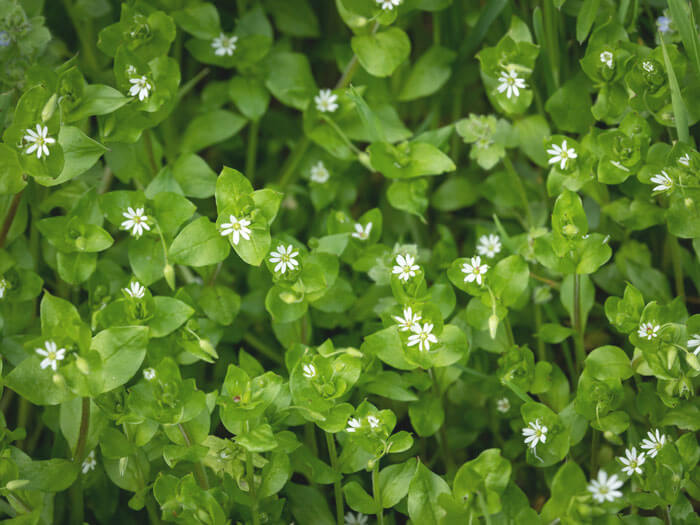 Gazing at the chickweed at her bedside, she said: "Mom! That's the star-flower plant that's by my favorite rock! Can we do that again?
Gazing at the chickweed at her bedside, she said: "Mom! That's the star-flower plant that's by my favorite rock! Can we do that again?
They used poultices of chickweed several times a day for the next few days, and the infection healed faster than it ever had with antibiotics. More importantly, it stayed clear – for many months. That's a holistic approach to healing.
When it finally did come back, Zelda went out to collect her plant ally himself. She's had no more conjunctivitis ever since!
So the next time the chickweed gets the jump on you, consider it not a curse but a thank-you gift from Mother Earth for creating a fertile piece of ground.
And if Zelda's story has you wondering about other herbal medicines to include in your family first aid kit, feel free dive deeper with my blog article on wise woman herbal medicines.
Making medicinal extracts of chickweed

An organic farmer friend called last week to say, "The chickweed is taking over here! I'll be plowing in a few days. Can you come get it first?"
We packed up our scissors, jars, organic raw apple-cider vinegar and 100 proof alcohol and headed out for the year's first herbal-medicine harvest.
It's easy for you to do this at home.
Make a chickweed tincture in 3 simple steps
- Stuff a jar full of freshly harvested chickweed and then fill the jar with alcohol.
- Cap it and let it sit for six weeks
- Strain out and compost the plant material. Store the tincture in a brown dropper bottle, taking 25-50 drops at a time.
The benefits of chickweed tincture have traditionally been used to nourish the kidneys, bladder and liver, as well as for irritated skin conditions and cooling the body during fevers or hot flashes.
To make vinegar, just substitute vinegar for the alcohol (if you have a metal lid, line it with plastic because vinegar rusts metal).
Keep the mineral-rich vinegar on your kitchen table; it makes a tasty seasoning on cooked greens or in homemade salad dressings and marinades. That way you can enjoy chickweed all year round!
Bring chickweed benefits home to your garden
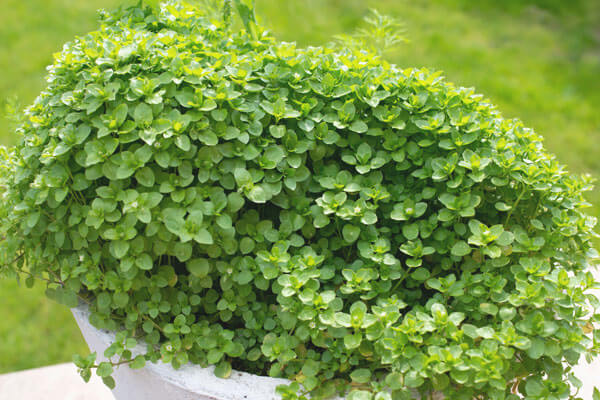 Because chickweed loves cool, wet weather, it is most lush in spring and fall.
Because chickweed loves cool, wet weather, it is most lush in spring and fall.
In many places, you can even harvest chickweed in the winter—I've even brushed snow aside to get at the plants! It shrinks down in response to the cold, with small, thick leaves, but it's still delicious and nutritious.
In summer, chickweed dies down to a brown, stringy mat, its seeds packed into beak-shaped pods. That's the time to plant it in your own garden so you can easily access the benefits of chickweed.
You may be tempted to curse this weed. However, by learning to work with chickweed, many gardeners find that it can make a wonderful cover crop—as an alternative to bare soil or mulching.
Because chickweed is low-growing, it doesn't compete with taller plants for sunlight.
And since the roots are shallow, it's easy to pull out when it gets in the way.
When I started my last garden, I wanted to encourage chickweed as a companion to my vegetables.
In the early summer, I found a patch of chickweed (by then just a brown mat loaded with seeds), put a bunch of this plant material into a plastic bag, and brought it home, where I—yup, God forbid—spread it across my garden beds.
When the cool rains began that fall, we were delighted to see the chickweed germinate.
For years now, that same patch has blessed my family and I with an abundant supply of lush chickweed. Most years, in fact, we eat more chickweed than any other green from our garden.
Incorporating chickweed benefits into your life
 Common chickweed is a star of the herbal kitchen table and medicine chest.
Common chickweed is a star of the herbal kitchen table and medicine chest.
To sum it up, there's a myriad of reasons to bring chickweed benefits into your life...
Nutritionally, chickweed is full of minerals like calcium, potassium, iron, phosphorus, manganese, vitamin C and B vitamins and even protein.
Medicinally, chickweed benefits the kidneys, bladder and liver and can cool the body during fevers when taken as a tincture.
As a poultice, chickweed can heal rashes, cuts, itches and infection better than most topical antibiotics.
So be on the lookout for chickweed and enjoy this tasty herb as food and medicine. Happy harvesting!
Spread the wise woman ways! Link to this article from your website or share with your friends using this button~
Comments ~ what stands out for you today?







